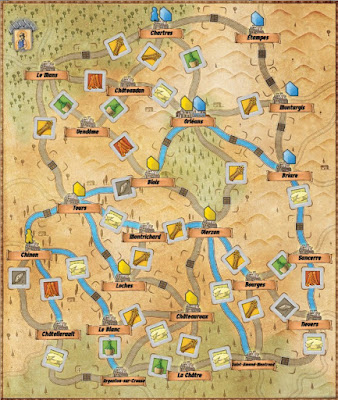The Game
Orleans is a bag-building game from 2014. That was an era not long
after Dominion the pioneer deck-building game was released in 2008.
Bag-building, mechanism-wise, is the same thing. It’s just that the physical
components are different. In Orleans, instead of cards in a deck, you
have chips in a bag. Poker chips, not potato chips. Chips are workers of
different types. Every round you draw a number of chips from your bag and
use them to perform actions. Once they are done, they go back to the bag.
The various buildings on your player board require specific combinations of workers types to work. If you don’t have that combination in hand, you can’t work the building. You can still choose to assign some workers there and hope that next round you will draw the remaining workers you need. But those workers sent will be idling this round.
One thing some buildings let you do is to buy new chips (workers). This
augments the composition of your bag. There is also an action which removes
chips from circulation. Your chips are boatmen, traders, soldiers,
craftsmen, scholars and the like. When you recruit a new worker, you get to
advance on a specific track. There are many tracks in the game and as you
advance you get various benefits.
You will have opportunities to construct new buildings. These are new places you can assign your workers and they give you new abilities.

One aspect of the game is a map showing towns around Orleans. You have a pawn on the map and you can travel about to claim goods and to build trading posts. Goods are worth points at game end, and trading posts too.
The game is played over 18 rounds, and events happen every round, sometimes causing trouble and sometimes presenting opportunities. That’s another aspect you have to handle.
The Play
The game gives you many strategic options - which kind of workers to go for, any buildings which you want to get, how do you travel on the map, which of the tracks to pursue. It’s interesting to manage your pool of workers. You want to tune your worker mix to best serve your strategic direction. Sometimes your needs change and you need to tune again.
Competition comes in many aspects. You race to grab buildings. On the tracks there are spots offering citizens (which help with map scoring) and you need to race to grab them. Movement on the map is a race too, because there are plenty of goods tiles to be picked up by whoever passes by first. There is a finite number of workers of each type. It is possible that they run out and you can't recruit any more. That's another thing you race for.

Worker retirement involves some competition too. When you want to remove a worker from circulation, you need to place it on an Important Deeds board. They go there to retire. There are different sections which give different rewards. Naturally you want to go for the bigger rewards most of the time. One twist is the player who places the last worker in a group gets a citizen. Now you need to be careful not to set up for your opponent to gain a citizen.
In a two player game there is less competition on the map. We went in different directions and did not interfere with each other. By late game we had established many trading posts and claimed many goods tiles.
This is a development game. Everyone starts with the same capabilities, but as you play you augment your abilities in different ways. It is satisfying to watch your powers grow.
The Thoughts
Orleans is a little different from typical deck-building games. Many deck-building games have two currencies, one is like money which you use to buy other cards, and the other is like strength, which you use for defeating monsters or beating up your opponent. Card deck-building games usually have cards with nifty powers. In Orleans, you simply have different types of chips, which can be used in different combinations for different purposes. The dynamics are different, and that is refreshing. You are constantly adjusting your bag composition, and it is satisfying to be able to see things pan out. The "reshuffling" happens very soon, because once a worker completes their task, they go back into the bag. Instant gratification!







No comments:
Post a Comment